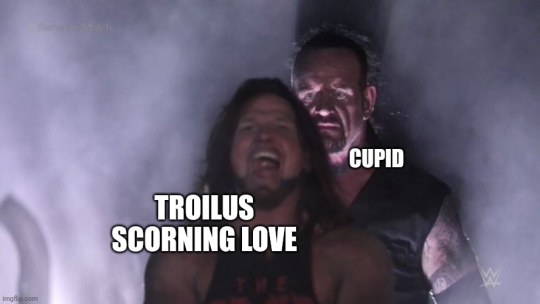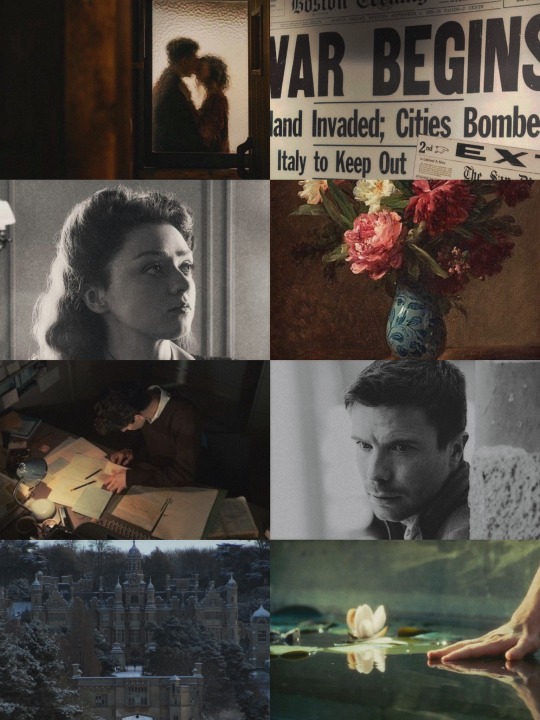#Troilus and criseyde
Explore tagged Tumblr posts
Text


first & second designs for Cressida! (Chryseis)
she plays more of a spy role in Lions & Men, only getting caught by Agamemnon while sneaking in between Troy & Achaea, who captures her after she is found out to be a spy (I don’t want almost every female character to be a slave, so I’m making up new reasons for her captured)
Since she’s mostly just a plot device in the Iliad, I took inspiration from Shakespeare’s Troilus & Cressida as well.
I also already have a lot of characters do I just made her a favorite of Apollo rather than her father.
#lions & men: the musical#cyborg art#greek myth retellings#cyborg au#trojan war#incorrect iliad#original art#character art#the iliad#troilus and cressida#troilus and criseyde#artists on tumblr#digital artist#small artist#oc artist#my characters
20 notes
·
View notes
Text
While preparing my fall seminars, I had found it increasingly difficult to think about how to teach Chaucer and not discuss Gaza. Not only because, if Chaucer doesn’t resonate with the lives and concerns of students now, I personally see little point in teaching him. Not only because a depoliticized Middle Ages is a Middle Ages made available to the uses and abuses of white supremacist history.1
Not only because my solidarity with Palestinian struggle does not end when I leave the protest crowd. And not only—although substantially—in memory of, the professor and poet murdered on or around December 6, 2023, who wrote about teaching Dickens and Shakespeare to students at the Islamic University of Gaza and watching them slowly come to identify with the despised Jewish figures of Fagin and Shylock.2
---
But, recently, while rereading Troilus in order to teach it, I was struck by the blunt reality of what lies at the core of Chaucer’s plot. Troilus is a poem about a city under siege. Its protagonists are a combatant—Troilus—seeking to defend that city, and a civilian woman—Criseyde—trying to negotiate her survival, even while being traded as a hostage as part of political negotiations in which she has no say. The war is not mere “backdrop.” It’s the engine of Troilus’s plot, grounding its every action: from the vulnerable Criseyde turning to Troilus for “lordshipe” (protection), to the revelation of Criseyde’s “betrayal,” when Troilus sees her brooch pinned on a coat of arms captured from the Greek soldier Diomede.
#shakespeare#william shakespeare#chaucer#gaza#Refaat Alareer#dickens#merchant#the merchant of venice#Troilus and Criseyde#troilus#troilus and cressida
12 notes
·
View notes
Text
I need some help! There are so so many versions of Troilus and Cressida and I’m inclined to start with either Chaucer or Shakespeare, but also wonder if I should go back to the works that inspired those or the epic that inspired another work that inspired another work that inspired Chaucer that inspired Shakespeare that hate-inspired Dryden, etc. So I don’t know whether it makes more sense to go chronologically or backwards or start with the famous ones or what. If I started with Roman de Troie I would then have to go read translations of Tanz salutz e tantas amors and Historia destructionis Troiae as a contrast to everything that Boccaccio inspired in every later version with his changes. Whether you have an actual preference or just want to press buttons, help me decide!
#geoffrey chaucer#william shakespeare#classic literature#troilus and cressida#Troilus and criseyde#tumblr polls#polls
6 notes
·
View notes
Text

Troilus and Criseyde ...
#troilus and criseyde#troilus and cressida#chaucer#geoffrey chaucer#meme#memes#funny memes#literature memes#literature meme#literature#history#medieval history#history meme
15 notes
·
View notes
Text
troilus and criseyde is a never ending nightmare
#chaucer when i catch you chaucer#how can someone activate my flight or fight via the written word#i really dislike the class im in as well#solid amount of the students are zionists#i also play a game called how long can i not talk because two people are arguing#troilus and cressida#troilus and criseyde
2 notes
·
View notes
Text

her looks appear somewhat disdainful, for she lets fall her glance a little aside in such manner, as if to say: ‘What may I not stand here?’
— Geoffrey Chaucer; Troilus & Criseyde
5 notes
·
View notes
Text
0 notes
Text
0 notes
Text
Imagine Troilus finally reaching his father temple, thinking he's safe , praying is dad just for him not being able to save him
Imagine Odysseus putting is pride finally aside and pray 7 years his friend-his goddess to save him and receive no answer
#Troilus#apollo#fuck Achilles#the illiad#achilles#trojan war#troilus and cressida#troilus and criseyde#ghostcast
49 notes
·
View notes
Text
Currently reading Chaucer’s Troilus and Criseyde!
#gonna start doing book updates cause why not!#currently reading#bookblr#classics#classic#dark academia#book academia#romantic academia#troilus and cressida#troilus and criseyde#geoffrey chaucer#bibliophile
0 notes
Text

WIP wednesday! Troilus & Cressida
#lions & men: the musical#character art#cyborg art#wip wednesday#art wip#current wip#troilus and cressida#troilus and criseyde#chryseis#artists on tumblr#original art#cyborg au#incorrect iliad#trojan war#the iliad
7 notes
·
View notes
Text
have i said i love chaucer's portrayal of troilus
#HE'S JUST SO. FUCKING PATHETIC#i need to read troilus and criseyde completely#i have the pdf so 🤑#jo.txt
1 note
·
View note
Text
Arya Stark & Gendry Waters AU: Atonement

“There goes my mother’s employer’s daughter, he once said to a friend. He had his politics to protect him, and his scientifically based theories of class, and his own rather forced self-certainty. I am what I am. She was like a sister, almost invisible. That long, narrow face, the small mouth���if he had ever thought about her at all, he might have said she was a little horsey in appearance. Now he saw it was a strange beauty—something carved and still about the face, especially around the inclined planes of her cheekbones, with a wild flare to the nostrils, and a full, glistening rosebud mouth.”
“So they wrote about literature, and used characters as codes. At Cambridge, they had passed each other by in the street. All those books, those happy or tragic couples they had never met to discuss! Tristan and Isolde, the Duke Orsino and Olivia (and Malvolio too), Troilus and Criseyde, Mr. Knightley and Emma, Venus and Adonis. Turner and Tallis. Once, in despair, he referred to Prometheus, chained to a rock, his liver devoured daily by a vulture. Sometimes she was patient Griselde. Mention of “a quiet corner in a library” was a code for sexual ecstasy. ”
#a story which gendry fell in love ned stark’s daughter again#but it is in 20th century#library scene=smithy scene#ww2 and gendrya#arya stark#gendry waters#ian mcewan#atonement#maisie williams#joe dempsie#period drama#gendrya#game of thrones#a song of ice and fire#asoiaf
21 notes
·
View notes
Text
Hope will emerge Like a gentle creature drawn from green shadows To steady his gaze. A fawn, soft in the wild, Followed only by more of its kind.
- from A Double Sorrow: A Version of Troilus and Criseyde, Lavinia Greenlaw
18 notes
·
View notes
Note
2 & 14💌📚
Did you reread anything? What?
byron's manfred and jenni nuttall's critical guide to troilus and criseyde 😭
What books do you want to finish before the year is over?
meditations of marcus aurelius and lovely green eyes by arnošt lustig. wtf just saw the "english" "translation" is like, 200 pages. whereas the polish translation i am reading is 500. is the english an abridged version or sth... unserious.
2 notes
·
View notes
Text
Tch. This website claims to "care" about "literature", and yet when was the last time you saw people posting about Chaucer's Troilus and Criseyde ??? 🙄🙄🙄🙄
4 notes
·
View notes